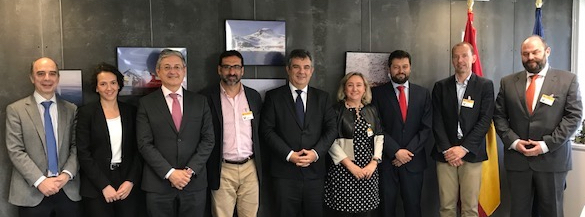The President of the CDTI receives the Spanish Group of Knowledge and Innovation Communities of the EIT

Madrid, 25 April 2018.-
The President of the CDTI (Centre for the Development of Industrial Technology) and Secretary General for Science and Innovation of the Ministry of Economy, Industry and Competitiveness, Juan Mª Vázquez, received this morning the Spanish group of Innovation and Knowledge Communities of the EIT. The six representatives of EIT Cross-KIC Spain have met for the first time with the highest representative of this Spanish public body to show him the lines of work that this group is carrying out jointly.
The meeting was attended by José Luis Muñoz, General Director of Climate KIC Spain and coordinator of this cross-cutting group, Jesús Contreras, Director of EIT Digital Spain, Begoña Pérez Villareal, Director of EIT Food CLC South-Spain, Marco Pugliese, General Director of EIT Health Spain, Mikel Lasa, General Director of EIT InnoEnergy, Iberia-Spain, and Lorena Jurado, Head of Business Development at EIT Raw Materials, along with the Secretary General for the Internationalisation of Science and Innovation, Ministry of Economy, Benjamín Sánchez and the Head of the UE’s Framework Programme Department, Guillermo Álvarez.
This strategic meeting highlighted the importance of these Innovation and Knowledge Communities (KICs), which represent a new model for boosting European competitiveness through innovation. Through joint work and the search for synergies in the common territorial area, they are emerging as a key transversal platform in the development of new products and services that respond to the challenges of society and economic growth in Spain.
During the meeting, Juan María Vázquez showed great interest in this initiative and its lines of work. In this sense, the President of the CDTI has assured that “the public sector cannot take on the challenge of innovation alone. For this reason, he added “it is essential to involve and collaborate with the different actors and sectors and thus improve competitiveness in our country.
For his part, José Luis Muñoz, coordinator and architect of this pioneering group initiative in Europe, said that “for the EIT it is extremely important that all the actors involved in these sectors work together, to take advantage of the opportunities presented to us in this new socio-technological framework, and thus improve competitiveness and increase the creation of new jobs”. Regarding the generation of employment, Muñoz highlighted the role that KICs play in supporting entrepreneurs with programs to accelerate ideas and startups in the different phases of their maturity, where “KICs are already developing these tasks in a sectoral manner, energizing and promoting the phases of ideation and creation of companies in early stages”.
For the members of EIT Cross-KIC Spain, the creation of this transversal group is another motivation to transform the talent and knowledge existing in Spain into new products and services that face the challenges of society, while generating sustainable economic opportunities and quality jobs.
Knowledge and Innovation Communities
These Innovation Platforms were created by the European Institute of Innovation and Technology (EIT), a European Union body to promote innovation and entrepreneurship in different areas of interest to society.
Specifically, 2010 saw the creation of Climate KIC, whose Spanish centre is based in Valencia, EIT Digital, based in Madrid, and EIT InnoEnergy, whose Spanish centre is based in Barcelona. In 2015, EIT Health and EIT Raw Materials joined the list. EIT Food has founded just over a year ago and has recently established its headquarters in Madrid.
The EIT has tasked these platforms with contributing to Europe’s competitiveness through sustainable economic growth by promoting and strengthening synergies, cooperation between business, education and research institutions. For this reason, Climate KIC Spain has taken the lead in presenting and creating this Spanish group, for future collaborations within the Spanish framework and with other European groups.
